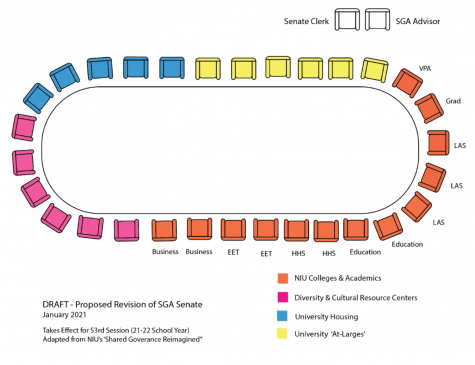SGA Senate discusses electoral district reform plan

Courtesy of NIU Student Government Association
Student Government Association logo
January 25, 2021
DeKALB – Student representation within the SGA Senate could change following a discussion on reforming the Senate districts at Sunday’s meeting.
The Senate currently consists of up to 30 senators divided into five electoral districts with six members in each group, according to the SGA Bylaws.
Those districts are based on geographical locations. District one includes university housing, districts two, three and four include off-campus students within DeKalb city limits, and district five includes off-campus students outside of DeKalb.
The new Senate would be made up of students who represent university colleges, diversity and cultural resource centers, university housing and the university at-large.
Speaker of the Senate Brad Beyer proposed the possible legislation and said the new model was created to better represent student voices, and it’s more modernized in relation to other universities with student governments.
“I will say, this is just a draft and this is going to be worked on throughout the week, but I have really worked on it a lot and I put a lot of effort and energy into coming up with this,” Beyer said. “I really liked the model as it currently stands.”
Multiple senators at the meeting were concerned with the representation of the colleges within the model.

The draft of the model shows three seats for the College of Liberal Arts and Sciences; two seats each for the College of Business, College of Health and Human Sciences, College of Education, College of Engineering and Engineering Technology; and one seat each for the College of Visual Performing Arts and the Graduate School.
Deputy Speaker Dallas Douglass said he encourages students to think about the importance of competitive elections, as they are “crucial to a functional healthy democracy.”
“I’m sure most of you are concerned about the allocation of seats to specific colleges and are worried about what happens if all the seats are filled, which will happen. I’m sure it will,” Douglass said.
Beyer said the seats were established based on enrollment numbers, so the college with the highest enrollment gets the most Senate seats.
Sergeant at Arms Clayton Schopfer said he’s concerned with department heads having too much say over who the representatives are for the new Senate model but still supports it.
“I think the new model makes it more likely that we have competitive elections, which will make it more likely that we get better representation in our student Senate,” Schopfer said.
Beyer said a vote on the Senate district reform will likely take place at the next Senate meeting at 5 p.m. Sunday via Microsoft Teams.
If the legislation is passed at next Sunday’s meeting, it wouldn’t take effect until Fall 2021.
Board of Elections
A resolution to approve five senators to the spring Board of Elections was tabled to next Sunday’s Senate meeting after not having enough nominations.
Each senator at Sunday’s meeting was nominated for the board by another senator, but only three accepted their nominations, along with Senate Clerk Dylan Moffitt. The three senators included Michael Verlinsky, Cristian Hernandez and Ebenezer Okpiri.
Accepting the position as a board member disqualifies the student from running as an elected official for the next session due to a conflict of interest, according to the SGA Bylaws.
Elected officials include senators, SGA president, vice president, treasurer and student trustee.
Students outside of the SGA Senate can also be nominated for the board, but they have to be present at the Senate meeting, Beyer said.
Five nominees, including the four previously nominated, will present themselves to the Senate at next Sunday’s meeting to be approved.








